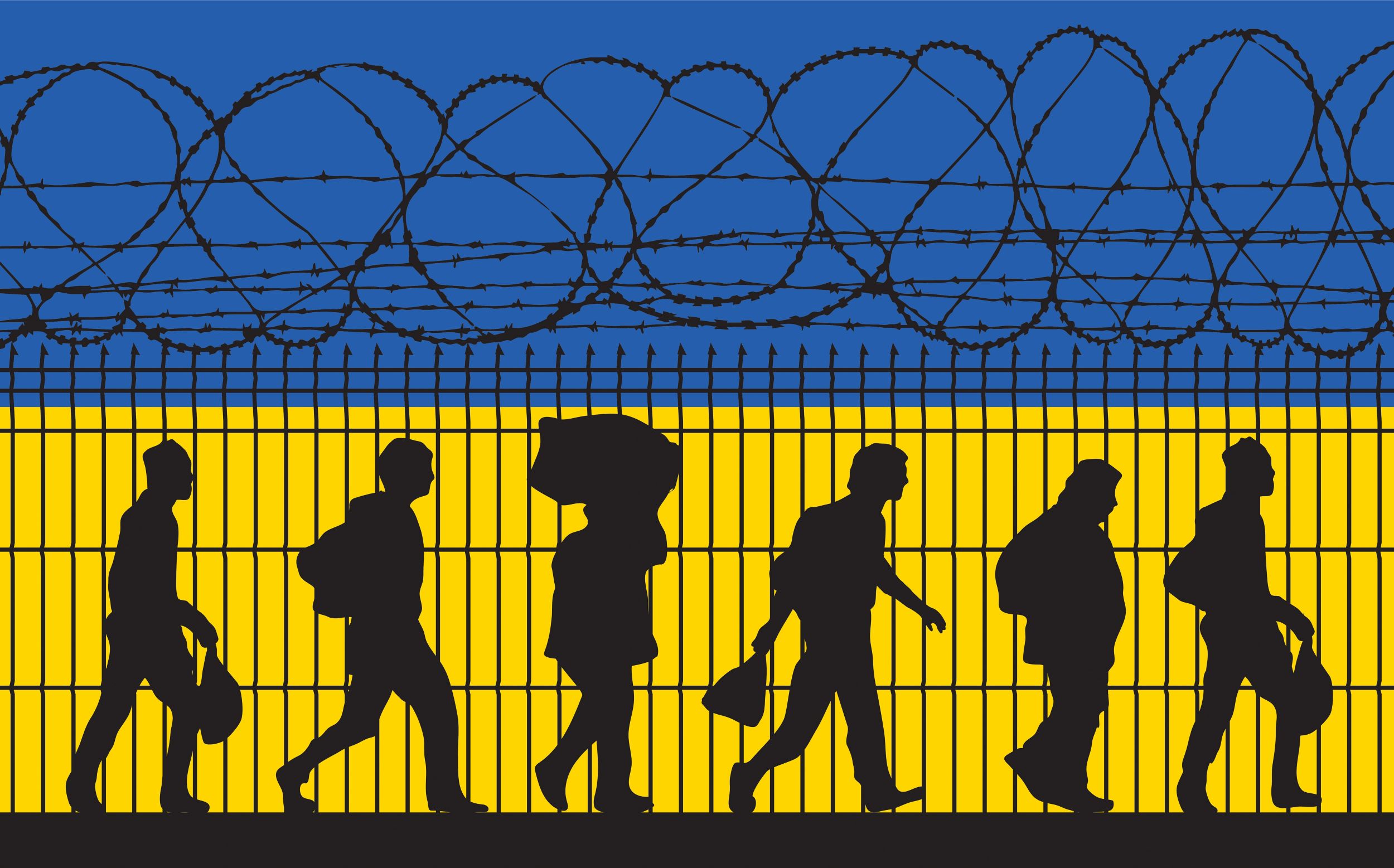Coverage of Ukrainian refugees has been more sympathetic because it is usually accompanied by images of the crisis they are fleeing
A great deal has been said about the differences between the coverage of Ukraine and Middle Eastern refugee crises. By showing the warm welcome that Ukrainian refugees have received in Europe, some media have highlighted the relative dehumanisation of those fleeing violent conflicts in Syria and Afghanistan.
Whether it’s a BBC reporter not challenging his interviewee about his “blond hair and blue eyes” stance, or CBS’s Charlie D’Agata calling Ukraine a “relatively civilised country” (unlike Iraq and Afghanistan, he meant), the analysis and well-deserved criticism of the coverage has been mostly focused on the language used by presenters.
But televised news coverage is more than just words read out loud or presenters’ opinions. The visual aspect of a news channel’s video piece is just as important.
I have been following the coverage of the Ukrainian refugee crisis since the beginning of the invasion. The family home where I was born is located a three-hour drive from the Ukrainian border, in the south of Poland. I did hope Poland wasn’t going to massively fail people fleeing the invasion, in the way it let down refugees trying to cross from Belarus a few months ago.
Thankfully, that has not happened. Poland welcomed Ukrainians with open arms, as did the rest of Eastern Europe. While accusations of racism and racial bias towards the different and various people trying to cross the borders are definitely valid, I think there are certain practices that could help change the perception of refugees within the media.
Just as the BBC showed the fathers being separated from mothers and children at Lviv’s platform 5, we should cover more personal stories taking places in war-torn countries on other continents
BBC World News Channel provided great coverage from Medyka, on the Polish-Ukrainian border. Its journalist, Kasia Madera, was speaking to refugees, volunteers and emergency services in real time, as the situation unfolded for everyone to see.
During her broadcasts, viewers could see the donations piling up, the trucks and ambulances parking nearby and the refugees trying to find their loved ones. The fast-paced broadcast took place during the day and was interspersed with the reminder of current events, for example the ongoing shelling.
As we have entered the fake news era, the general public has lost its trust in the media. Therefore, it is unsurprising that unedited, live coverage of events is taken more seriously. Live coverage appears to give an issue a priority within the news environment.
Of course, when Middle Eastern and African refugees were tragically trapped in freezing forests of Belarus and Poland, broadcasters couldn’t cover the situation at the border freely. That was due to the no entry zone established by Polish officials.
However, after revisiting the news reports from the Belarusian-Polish refugee crisis that took place a few months back, it becomes apparent that most of the mainstream news stations (BBC, DW etc) included little, if any, socio-political context. There was no visual reminder of why Afghans, Cameroonians and refugees from other countries were trying to escape their home countries.
When reporting on people trying to flee countries in the Middle East and Africa, the coverage should start with the genesis of their issues. The shots of reporters driving in their cars, reporting from the quiet streets of nearby cities or isolated volunteers making phone calls are not enough.
Shots of refugees camping in the darkness of the night and getting upset at border guards can have a sinister feel to those who on a day-to-day basis get their news from tabloid media
It is our job as media professionals to produce content that is interesting, attention-grabbing and compelling enough for people to take interest in the given issues. The contrast between extreme close ups and wide shots, real-time interviews with people who are about to embark on a dangerous journey, infographics and statistics about war-torn countries presented during news reports - all of these techniques could help make the public care more about refugee crises in general.
Eliminating insensitive language and making ethical content should be our absolute priority. But we also have to make sure that the future refugee crises are covered using the correct visual techniques and appropriate planning.
Shots of refugees camping in the darkness of the night and getting upset at border guards can have a sinister feel to those who on a day-to-day basis get their news from tabloid media.
Just as the BBC showed the fathers being separated from mothers and children at Lviv’s platform 5, we should cover more personal stories taking places in war-torn countries on other continents. To make sure the public gets a full understanding of the issue, we need to expand our coverage.
It is important to remember that amid the horrific events in Ukraine, current and future refugees all over the world need our attention as well. Let’s hope the level of future coverage matches the standard we’ve been seeing since the crisis in Ukraine began.
Tomasz Lesniara is a Polish journalist based in Glasgow, UK
The views expressed in this article are the author’s own and do not necessarily reflect Al Jazeera Journalism Review’s editorial stance













![Palestinian journalists attempt to connect to the internet using their phones in Rafah on the southern Gaza Strip. [Said Khatib/AFP]](/sites/default/files/ajr/2025/34962UB-highres-1705225575%20Large.jpeg)


























